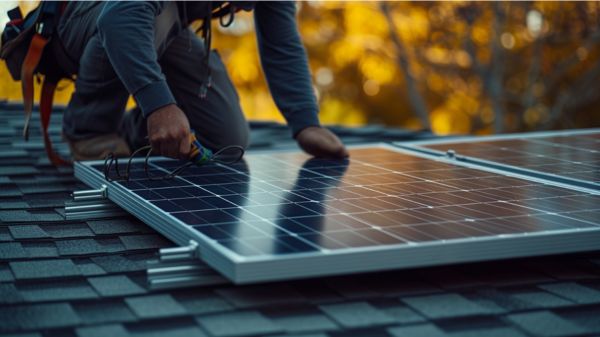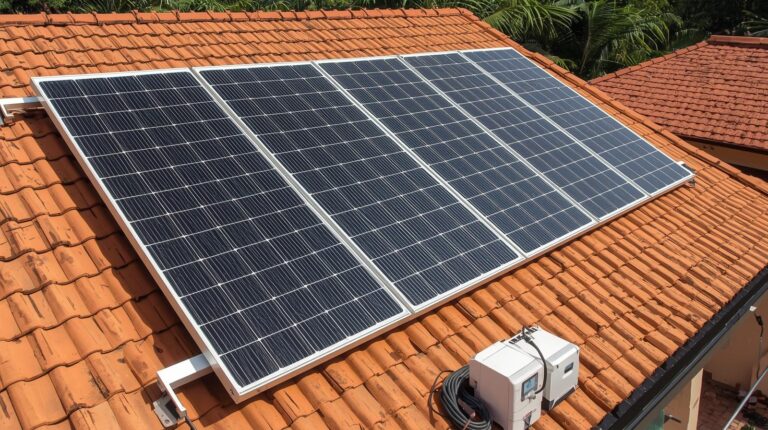Are you tired of sky-high electric bills and looking for a sustainable solution? Well, have you ever considered a budget-friendly solar power system?
It’s understandable to be cautious about making such an investment, but let’s explore the reasons why choosing a budget-friendly solar power system might be the perfect choice for you.
From long-term cost savings to reducing your carbon footprint, the benefits are undeniable. But that’s not all; there’s something even more intriguing that awaits.
Key Takeaways
- Budget-friendly solar power systems offer cost-saving benefits by reducing energy expenses and electricity bills in the long run.
- These systems provide financial incentives and savings on electricity costs, helping to offset high-cost marginal consumption during periods of high electricity demand.
- By taking advantage of lower electricity rates during off-peak hours, budget-friendly solar power systems can further contribute to cost savings.
- Choosing a budget-friendly solar power system involves evaluating upfront costs, location-specific aspects, long-term savings, and energy consumption needs, while comparing the cost of the system with potential energy production.
Cost-Saving Benefits of Budget-Friendly Solar Power System
Budget-friendly solar power systems offer cost-saving benefits to homeowners by reducing their energy expenses. By installing a solar power system, you can significantly cut down on your electricity bills in the long run. The cost of electricity from traditional sources is constantly increasing, but with a budget-friendly solar system, you can generate your own clean and renewable energy, reducing your dependence on the grid.
One of the main benefits of budget-friendly solar power systems is the savings on electricity costs. Depending on your current electricity pricing scheme and rate structure, the amount of savings may vary. However, regardless of the specific pricing scheme, solar power can provide substantial financial incentives. Time-varying pricing schemes, for example, can make solar power even more beneficial, as it allows you to take advantage of lower electricity rates during off-peak hours.
Additionally, seasonal pricing fluctuations can make solar power more valuable. During periods of high electricity demand, when prices tend to spike, your solar power system can help offset those high costs. This is particularly beneficial for homeowners with tiered pricing plans, as solar arrays can offset high-cost marginal consumption.
Factors to Consider When Choosing a Budget-Friendly Solar Power System
When selecting a solar power system that fits within your budget, there are several important factors to consider. First and foremost, you need to evaluate the upfront cost of the system. This includes the cost of solar panels, inverters, and other necessary equipment, as well as installation costs. It’s crucial to compare the cost of a solar power system with the potential energy production it can provide. This will help you determine if the system is affordable and if it will meet your energy consumption needs.
Another factor to consider is the location-specific aspects that can affect the performance of your solar power system. Factors such as solar irradiation levels and roof orientation can impact the amount of electricity your system can generate. It’s important to assess these factors to ensure optimal generation of renewable energy.
Furthermore, you should also evaluate the long-term savings and benefits of a budget-friendly solar power system. Although the upfront cost may be higher than traditional energy sources, the potential for long-term savings through reduced electricity bills and government subsidies can make solar power more affordable in the long run.
Designing a Cost-Effective Solar Power System for Residential Use
To design a cost-effective solar power system for residential use, careful consideration must be given to factors such as installation and maintenance costs, potential energy gains, and the long-term benefits of reducing both electric bills and carbon footprints.
Here are three key steps to designing a cost-effective solar power system for your home:
- Assess your energy needs: Before installing solar panels, it’s important to determine how much electricity your home consumes on a monthly basis. This will help you determine the size and capacity of the solar panel system you need. Consider factors such as the number of occupants, energy-efficient appliances, and future energy requirements.
- Evaluate installation options: While hiring professionals for solar panel installation can be costly, it ensures a proper and efficient setup. However, if you have the skills and knowledge, a DIY solar panel installation can save money. Research local regulations, permits, and incentives to make an informed decision.
- Calculate costs and savings: Determine the upfront costs of purchasing and installing solar panels, as well as ongoing maintenance expenses. Compare this with the potential savings on your monthly electricity bills. Additionally, consider the long-term benefits, such as increased home value and reduced carbon footprint, when evaluating the return on your investment.
Related Post: The 6 Best DIY Solar Power Kits for Homes: Our Top Picks for You.
Maximizing Energy Efficiency With a Budget-Friendly Solar Power System
Maximizing energy efficiency is essential when implementing a cost-effective solar power system for your home. With a budget-friendly solar power system, you can harness the power of solar energy to generate clean and renewable electricity. By optimizing the energy efficiency of your solar installation, you can further enhance the benefits of this affordable and sustainable energy source.
One way to maximize energy efficiency is by ensuring that your solar power panels are properly installed and positioned. This includes selecting the ideal location for optimal sunlight exposure and utilizing the correct angle and tilt for maximum energy absorption. Additionally, regular maintenance and cleaning of the panels can help prevent dirt and debris from obstructing sunlight and reducing their efficiency.
Another way to enhance energy efficiency is by using energy-efficient appliances and lighting in your home. By replacing outdated and energy-intensive devices with more efficient ones, you can reduce the overall energy consumption of your household. This, in turn, allows your solar power system to meet a larger portion of your energy needs, resulting in greater cost savings and environmental benefits.
Furthermore, investing in energy storage solutions, such as batteries, can help maximize energy efficiency. These storage systems allow you to store excess energy generated by your solar panels during the day and use it during periods of low solar availability. This enables you to further reduce your reliance on the grid and maximize the utilization of your clean energy generation.
Long-Term Savings With a Budget-Friendly Solar Power System
By optimizing the energy efficiency of your solar installation and implementing a budget-friendly solar power system, you can secure long-term savings on energy costs while reducing your reliance on traditional energy sources.
Here are three reasons why a budget-friendly solar power system can provide you with significant long-term savings:
- Reduced energy costs: Installing solar power panels on your home allows you to generate your own electricity using the free and abundant energy from the sun. By harnessing solar energy, you can significantly reduce or even eliminate your monthly electricity bills. Over time, the savings on your energy costs can add up, allowing you to recoup your initial investment and enjoy long-term savings.
- Government subsidies and incentives: Many governments offer subsidies and incentives to encourage the adoption of solar energy systems. These programs can help offset the cost of installing solar panels, making it more affordable for homeowners. By taking advantage of these subsidies and incentives, you can further reduce the cost of your solar energy system and increase your long-term savings.
- Increased home value: Installing a solar energy system can also increase the value of your home. Potential buyers are often willing to pay a premium for homes with solar panels, as they recognize the long-term savings and environmental benefits associated with solar energy. This means that if you decide to sell your home in the future, you can potentially recoup your investment and even make a profit.
Conclusion
Opting for a budget-friendly solar power system can lead to significant cost savings, reduced carbon footprints, and potentially increased home values.
By harnessing the power of the sun, homeowners can enjoy a cleaner and more sustainable environment while keeping their wallets happy.
So, seize the opportunity to save and secure a sustainable future with a budget-friendly solar power system.




